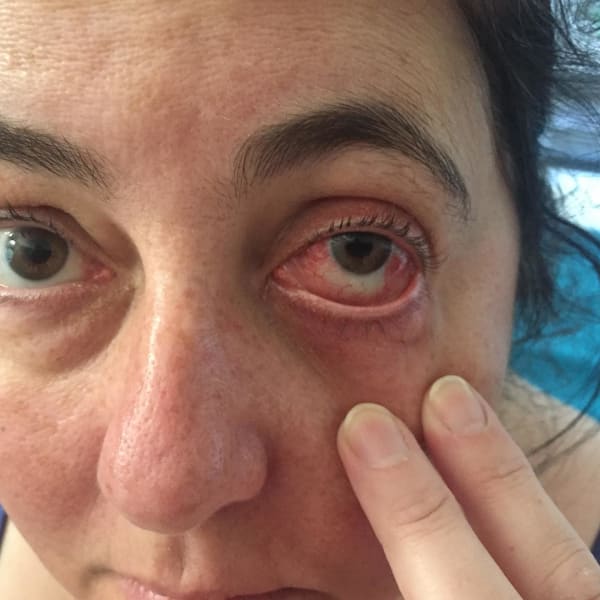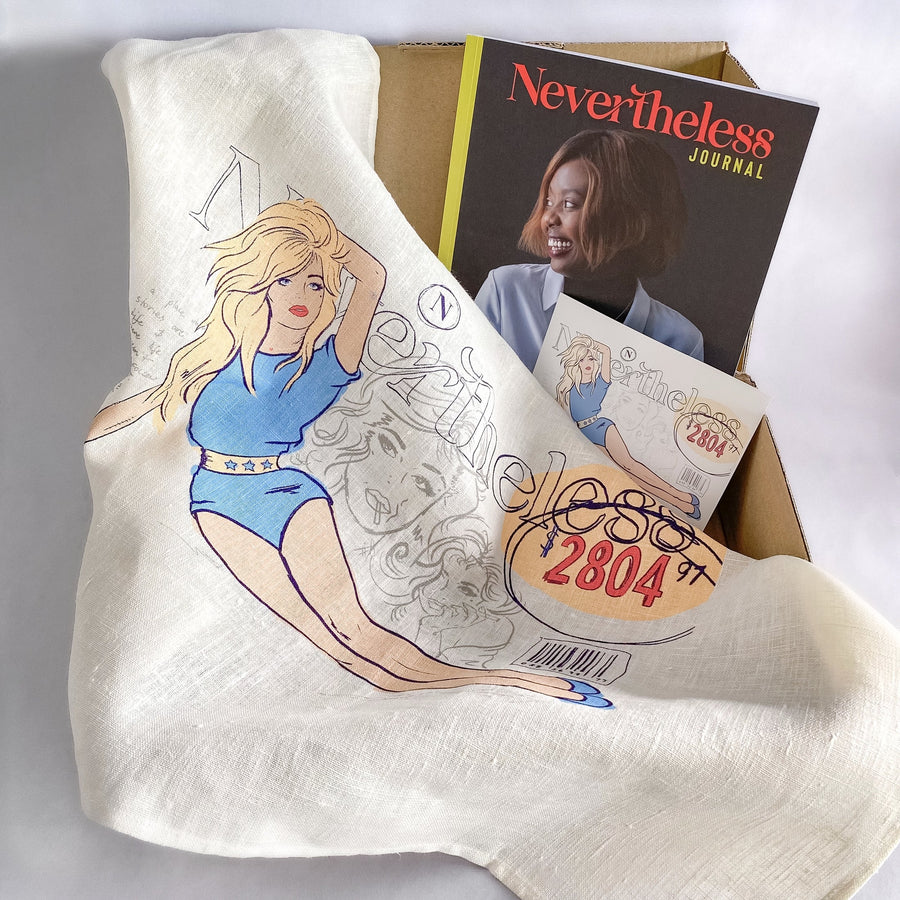The pain behind the puppets

Words by Natalie O'Driscoll
Elissa Jenkins is many things. A puppeteer and artistic director, a professional communications manager, a writer and publisher and a social entrepreneur. In the past she’s held leadership positions at major NGOs, run for political office and been heavily involved in party politics. She’s also immunocompromised and coming out of three and a half years of hell, suffering from a largely invisible illness called Scleritis.
* This article contains a close up image of a medical condition in an eye
The American Academy of Ophthalmology says that the sclera is the white part of the eye. And when the sclera is swollen, red, tender or painful (ie. experiencing inflammation), it’s called Scleritis.
Elissa has also been living with an autoimmune disease for 12 years. It is common for people with Scleritis to have another disease, like an autoimmune disease that causes many of the symptoms of Scleritis.
Elissa describes living with Scleritis as “living with excruciating pain.”
“It’s like someone punching you in the arm, but constant. It doesn’t go away. It’s like a force. It was often in the back of my eye, and under my eye, the bit that no one sees.”
For the first three years Elissa’s condition was invisible. No one noticed, not least of which were the 30,000 children she and her husband performed to during that time through their puppetry practice Larrikin Puppets.
No one noticed, that is, until she recently started experiencing Dry Eye as a side effect to being peri-menopausal and prolonged use of certain medications.
“For the past four months I’ve been battling Dry Eye,” Elissa said. “So both eyes are bloodshot.”

“When you have Scleritis you have to treat it or you could go blind. In the 70s they used to cut out your eye but now they have medication. I’ve spent the last three years trying to save my vision. Dry Eye is not affecting my quality of life like Scleritis was, but now people can see it and now they are sympathising.”
“The medication creates fat around your belly, you can get a bump on the back of your neck. It causes muscle wastage. It’s horrible but it’s the only thing that works. Short term it’s amazing, but long-term it is not good for you. And even then, it doesn’t get rid of the Scleritis, it just treats it while you’ve got it.”
>>> Shop all things Nevertheless
Elissa said there were two particularly difficult things about living with Scleritis. One was getting fatter, and the other was getting weaker.
“I’ve always been a larger woman but I’ve never had fat around my tummy before and I’ve also been pretty strong.”
Elissa had learned about living with an autoimmune disease and inflammatory symptoms on her body well before Scleritis took hold. But coming to terms with the Scleritis led her to discover the Health At Every Size movement. She says the fascinating thing about getting fatter is that people feel huge sympathy for her size while diminishing her focus on prioritising her sight.
“It’s fascinating for people to think you might prefer to be thin with no sight rather than to be fat with your sight intact,” Elissa said.
“I’m one of these people who is very health oriented and so I fight for my health every day. It’s like a part-time job for me. It really started to fascinate me, here I was getting fatter, yet here I was prioritising my health.”
Elissa is passionate about the fact that we need to be kind to people, no matter what size, because it shouldn’t matter why they’re fat anyway.
“The judgement should end and you should treat fat people just like any other person,” she said. “I have done a lot of learning around my own internalised fatphobia and what it means.”
Elissa is focussed now on intuitive eating and joyful movement.
“It’s a lifetime of learning that needs unlearning. So I’ve been doing that simultaneously with healing.”

One of Elissa’s support network, her general physician, who promotes herself as a weight-neutral professional, helped her learn that self-compassion can actually reduce inflammation.
“Those things you do for yourself, like taking long baths, or going for a walk in nature or doing meditation, or whatever it is you love, that joyful movement…” Elissa explains, “they have a fundamental physiological health benefit. You think you’re doing it for your mind, but it’s also good for your body.”
Elissa has adapted her work and home life to ease the burden of living with Scleritis. She explains that it is hard to do that in the moment when you’re in extreme pain. You simply cannot be assertive.
“It’s only when I’ve started feeling better that I can advocate for myself better,” she explained.
So, the puppetry business she works in with her husband has updated its terms to include accessible loading within 100m of the venue, or an additional fee so they can pay someone to bump-in. She’s used one of her puppetry rolling stools in the kitchen to assist with mobility and they’re reduced the number of shows they’re delivering every week as well.
“I’m still very nervous about injuring and hurting myself. So, I just try and make sure I don’t overdo it, but I’m a people-pleaser and I hate cancelling or letting people down.”
“I’d probably tell my past self that chronic stress is a huge contributor to autoimmune disease.”
“The chronic stress I experienced was due to my time in active politics and active party politics,” Elissa said, “I think that was a huge challenge for me, and I just went beyond the call of duty.”
“Comparatively I work much less than I used to and I’m able to work at my own pace. And I live at the beach so get to do nice things like look at sunsets. For someone that’s not very able-bodied, it’s really easy for me to be able to see the water.”
When I asked Elissa about what we can do to raise awareness about invisible conditions like autoimmune diseases and Scleritis she says it just comes back to that classic concept of being kind to people.
“You never know what battle people are fighting, you don’t know their story.”
“I bought a badge the other day and it says ‘Fighting Invisible Battles’. I don’t know if anyone sees it or if they see it they think about what it means. It’s really saying just be kind to me. No one should have to wear a badge that says be kind and compassionate to me because I’m sick. But even healthy people deserve that.”


